The latest jobs have been announced by the Provincial Assembly of Sindh, which has been advertised in the newspaper on June 9, 2025. If you are interested in Provincial Assembly of Sindh jobs, you have come to the right place. You will get complete information about Provincial Assembly of Sindh jobs.
These Provincial Assembly of Sindh jobs will be on the basis of merit. Any candidate who meets the merit will be able to get jobs in Pakistan in 2025. These jobs are for both men and women. Any candidate who meets these jobs will be able to get jobs in Sindh.
There are jobs in Provincial Assembly of Sindh, read and understand it before applying and only then apply. It may happen that you are not meeting the deadline for these jobs and your application form will be rejected. I am saying once again, before applying for Provincial Assembly of Sindh jobs, read and understand the information given below carefully and only then apply.
Details of Provincial Assembly of Sindh Jobs
| Post Date | 09-06-2025 |
| Industry | Government |
| Jobs Location | Sindh Pakistan |
| Hiring Organization | Provincial Assembly of Sindh |
| Last Date | 09-07-2025 |
| Education Require | Relevant Qualification |
| No of Posts | 284+ |
| Employment Type | Full Time |
| News Papers | DAWN newspaper |
| Address | Provincial Assembly of Sindh, Pakistan |
Eligibility Criteria for Provincial Assembly of Sindh Jobs
- Must hold Sindh domicile.
- Educational qualifications: Matric to Master’s level depending on the post.
- Experience: Required/preferred for most positions.
- Typing Speed: Mandatory for clerical roles (30-40 wpm).
- Physical Fitness: Needed for security-related positions.
- Special Certifications: Like CCNA, DIT, CIT, etc., will be an added advantage.
Age Relaxation
A general age relaxation of 15 years in the upper age limit is applicable as per Government of Sindh rules.
Contact Information
Pakistan Testing Service (PTS)
Website: www.pts.org.pk
Email: info@pts.org.pk
Phone: +92-051-111-111-787
Available Posts with Details of Provincial Assembly of Sindh Jobs
High-Level Positions (BPS-17 to BPS-19)
| Sr# | Post Title | BPS | No. of Posts | Qualification | Age |
|---|---|---|---|---|---|
| 1 | Consultant PAC | 19 | 1 | 16 Years Graduation, 5 yrs experience | 22-28 |
| 2 | Assistant Secretary | 18 | 5 | 16 Years Graduation, 2 yrs experience | 22-28 |
| 3 | Director IT | 18 | 1 | BCS/BE/MBA (MIS), 3 yrs experience | 22-28 |
| 4 | Reporter | 18 | 5 | 16 Years Graduation, 2 yrs experience | 22-28 |
| 5 | Assistant Director IT | 17 | 3 | BCS/BE/MBA (MIS) | 20-28 |
| 6 | Assistant Secretary | 17 | 5 | Graduate (2nd div), experience preferred | 20-28 |
| 7 | Assistant Director Network | 17 | 2 | BE (Networks), CCNA preferred | 20-28 |
| 8 | Assistant Engineer (Electrical) | 17 | 4 | BE Electrical | 20-28 |
| 9 | Assistant Engineer (Electronic) | 17 | 2 | BE Electronics | 20-28 |
| 10 | Assistant Director (Monitoring) | 17 | 1 | Graduate (2nd div) | 20-28 |
| 11 | Editor of Debates | 17 | 1 | Graduate | 20-28 |
| 12 | Law Officer | 17 | 1 | LLB | 20-28 |
| 13 | Public Relations Officer | 17 | 2 | Graduate | 20-28 |
| 14 | Reporter | 17 | 2 | Graduate | 20-28 |
Mid-Level Posts (BPS-14 to BPS-16)
These roles include support and administrative positions essential for the operation of the Assembly:
- Assistant (BPS-16) – 25 posts
- Assistant Protocol Officer (BPS-16) – 4 posts
- Assistant Recording Officer (BPS-16) – 1 post
- Supervisor Legislation (BPS-16) – 1 post
- Sub-Editor of Debates (BPS-16) – 2 posts
- Assistant Security Officer (BPS-16) – 2 posts
- Assistant Librarian (BPS-16) – 3 posts
- Photographer (BPS-14) – 1 post
- Cameraman (BPS-14) – 2 posts
- Junior Scale Stenographer (BPS-14) – 28 posts
- Sub-Engineer Electrical/Electronics (BPS-14) – 12 posts
- Photographer (BPS-13) – 1 post
Clerical & Technical Staff (BPS-09 to BPS-13)
These posts provide technical and clerical support to various departments:
- Data Entry Operator (BPS-12) – 1 post
- Junior Clerk (BPS-11) – 52 posts
- Lady Security Assistant (BPS-11) – 1 post
- Senior Proof Reader (BPS-11) – 1 post
- Junior Translator (BPS-11) – 5 posts
- Care Taker (BPS-09) – 14 posts
- Technician (BPS-09) – 1 post
- Traffic Controller (BPS-09) – 4 posts
- Record Clerk (BPS-09) – 8 posts
- Security Assistant (BPS-09) – 20 posts
- Security Supervisor (BPS-09) – 10 posts
Skilled & Support Staff (BPS-05 to BPS-07)
- Proof Reader (BPS-07) – 3 posts
- Junior Security Assistant (BPS-07) – 19 posts
- Watch & Ward Assistant (BPS-07) – 2 posts
- AC Plant Operator (BPS-06) – 10 posts
- Audio Keyboard Operator (BPS-05) – 1 post
- Qarie (BPS-05) – 4 posts
- Traffic Controller Assistant (BPS-05) – 10 posts
How to Apply for Provincial Assembly of Sindh Jobs
- Visit PTS Website: www.pts.org.pk
- Download Form: Get the application form and deposit slip.
- Pay Fee: Deposit the test fee in any branch of HBL or UBL.
- Submit Documents: Send filled form with paid deposit slip to:
- Pakistan Testing Service
- Adeel Plaza, 3rd Floor, Fazl-e-Haq Road, Blue Area, Islamabad
- Apply Separately: For each post, submit a separate form and fee.
- No TA/DA will be provided.
- Government employees must apply through proper channel.
- False/incomplete information will lead to cancellation.
- Foreign degree holders must submit equivalency certificate.
- Security clearance and medical checks will be conducted for final selection.
- Vacancies may be increased or decreased.
- Application with errors, omissions, or missing deposit slip will be rejected.
- Applications received after the deadline will not be considered.
Advertisement of Provincial Assembly of Sindh Jobs
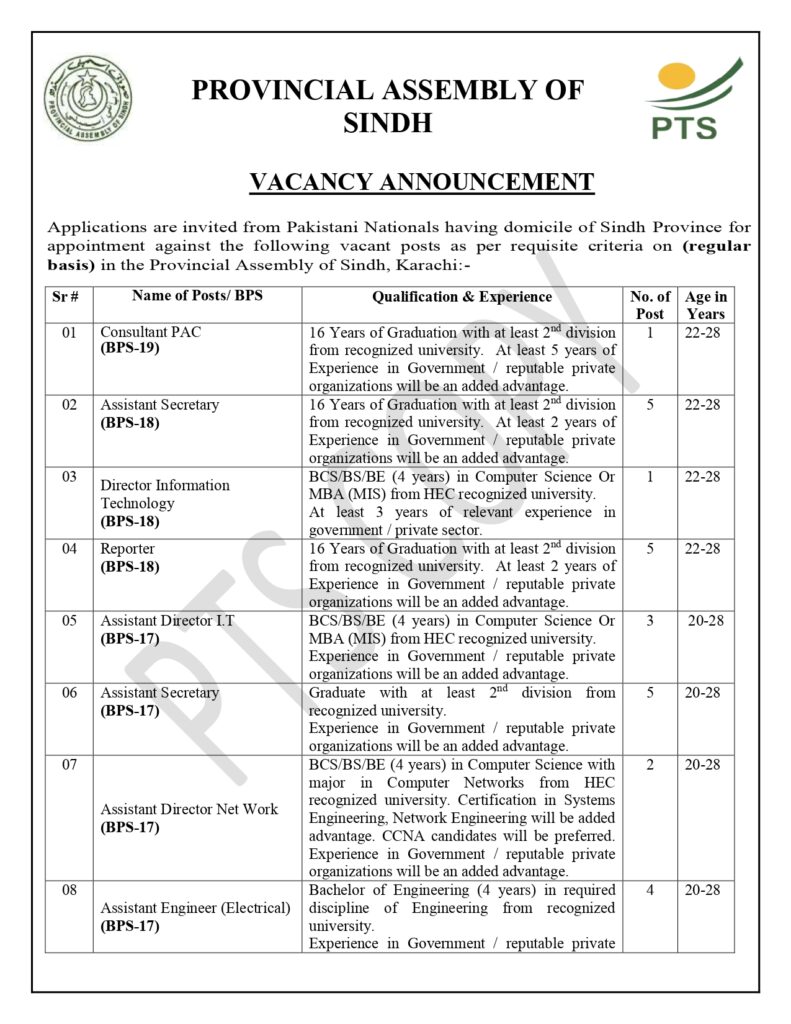
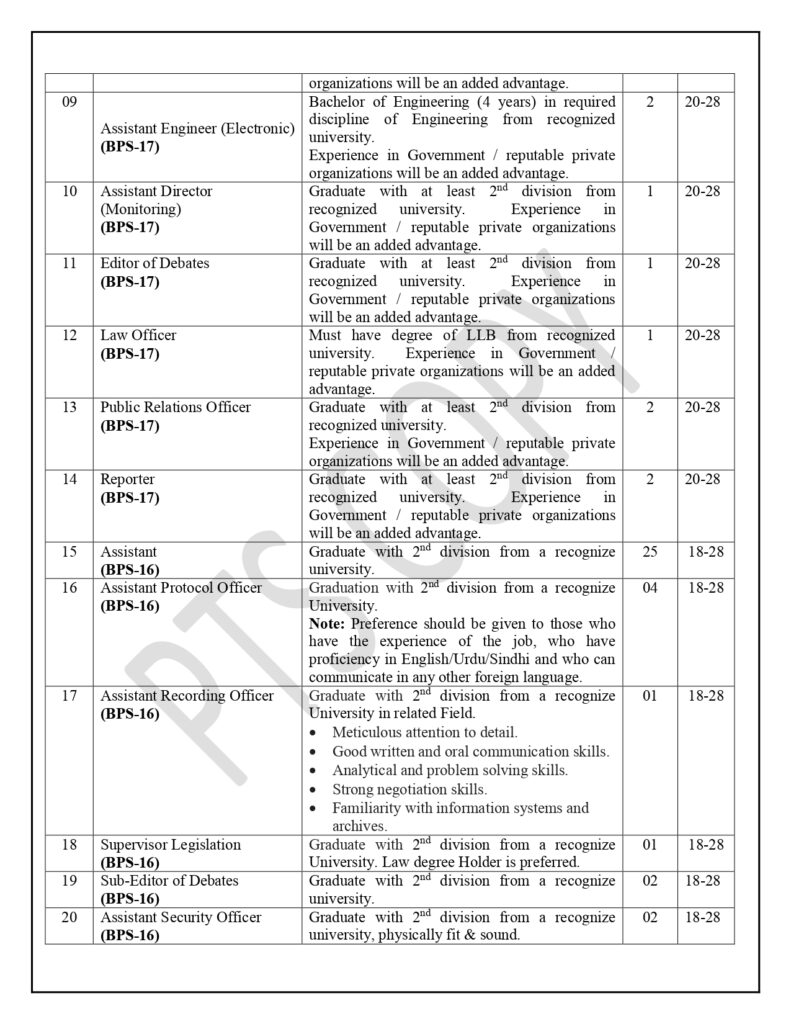
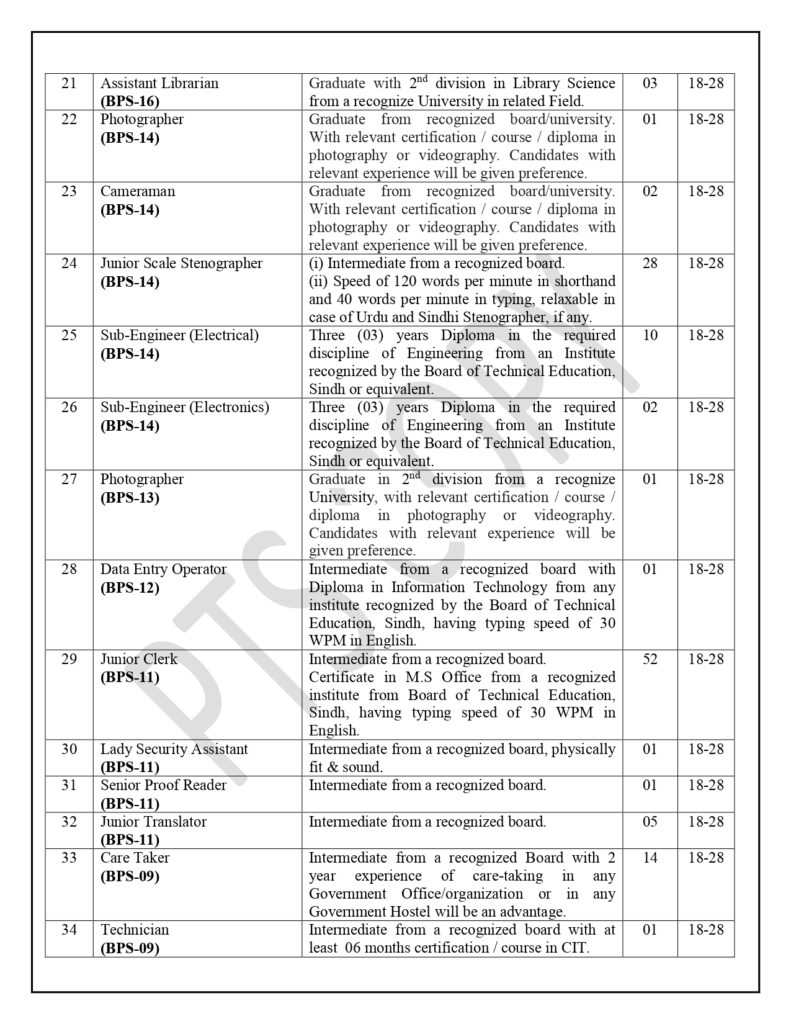
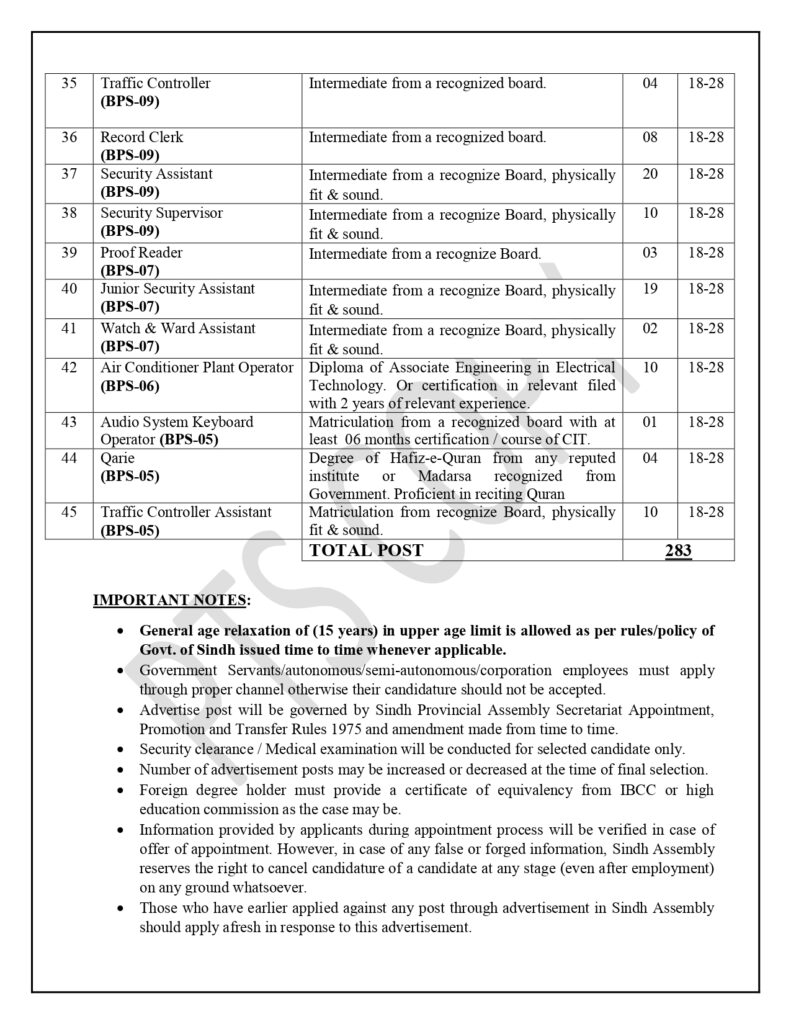
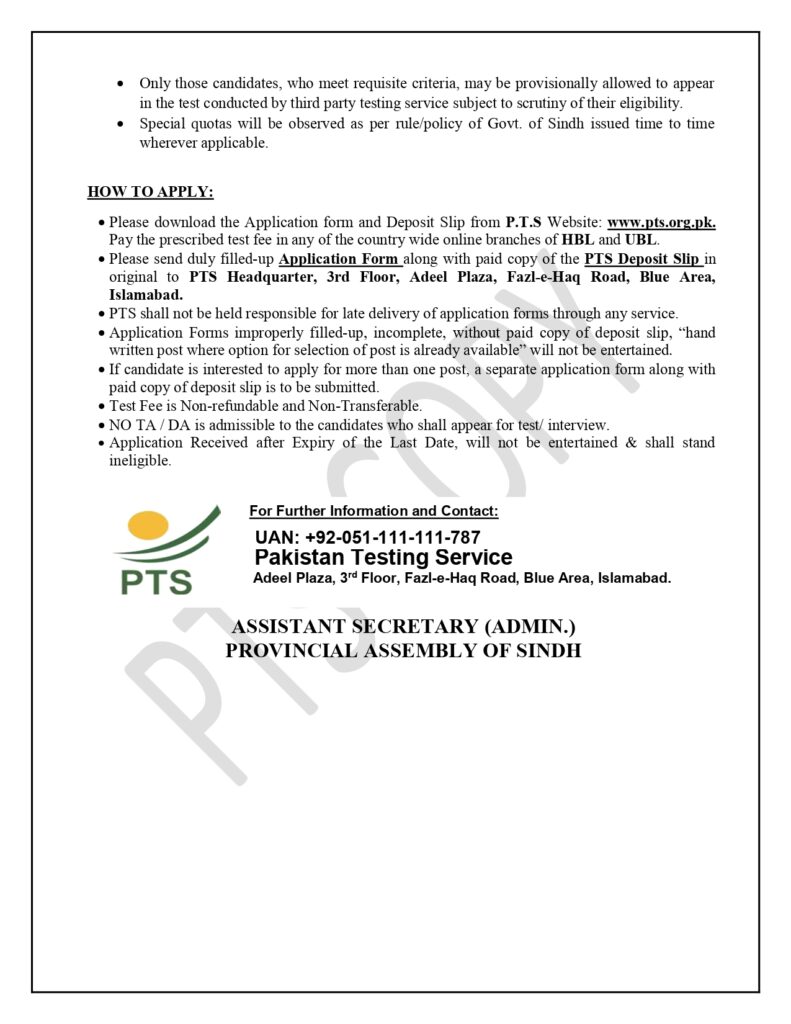
Online Apply for Provincial Assembly of Sindh Jobs
The procedure for applying online for Provincial Assembly of Sindh jobs is that you will go to the official website of PTS and click on the button for available posts as shown in the image below. You have to do the same.
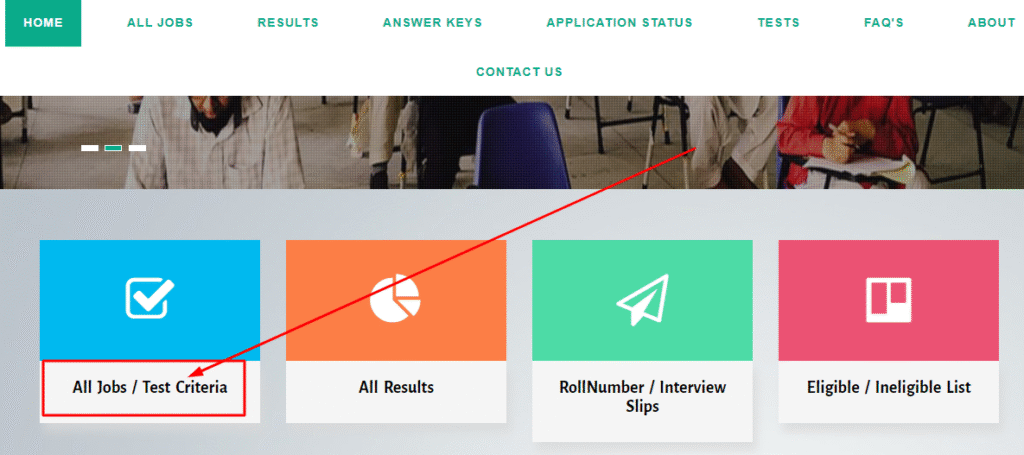
After that, jobs will be posted. Select the job you want to apply for and then fill in the application form. You will be applied. You have to do it as shown in the image below.
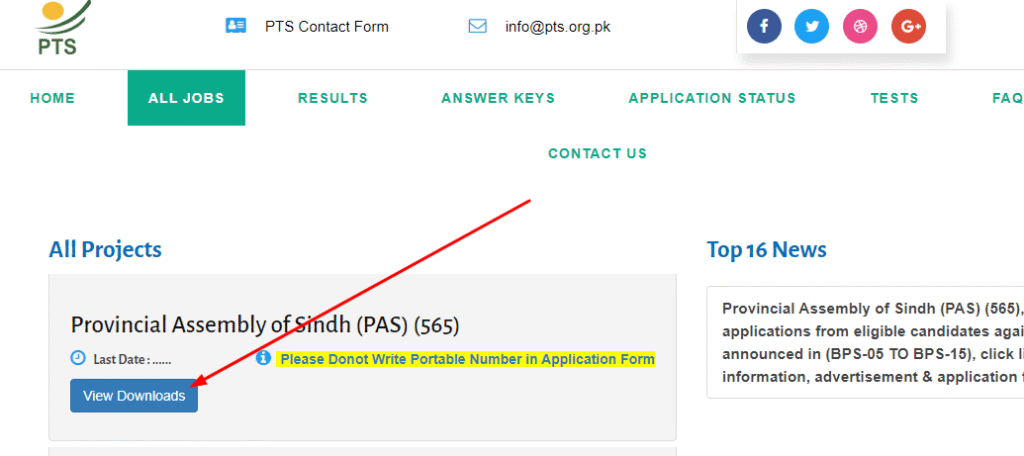
You cannot apply online for Provincial Assembly of Sindh jobs. You have to download the application form for each job. For any new post you want to apply for, we will download this black box, fill in the form and submit the challan fee for this through UBL or HPL bank, which will be a non-refundable fee.
About Provincial Assembly of Sindh
The Provincial Assembly of Sindh is one of the four provincial legislatures in Pakistan, holding a pivotal role in the democratic governance of Sindh province. It serves as a law-making body, overseeing executive actions and addressing public grievances.
Historical Background
Established in 1937 under the Government of India Act, the Sindh Assembly has evolved through colonial times, partition, martial laws, and democratic restoration. Its roots date back to the British Raj, but it has grown to become a symbol of Sindh’s identity and governance.
Importance in Pakistan’s Political Structure
The Sindh Assembly isn’t just a legislative house—it’s the very heartbeat of the province’s democracy. It bridges federal laws and provincial realities, ensuring local governance aligns with the people’s needs.
Structure of the Provincial Assembly
Number of Members
The Assembly comprises 168 members, elected through a mixed electoral system.
- General Seats: 130
- Reserved for Women: 29
- Reserved for Minorities: 9
Constituencies and Representation
Sindh is divided into multiple electoral constituencies based on population, ensuring fair representation across districts like Karachi, Hyderabad, Sukkur, and rural regions.
Functions and Responsibilities
Legislative Role
Its core function is to draft, debate, and pass provincial laws. From education policies to agriculture reforms, the Assembly is responsible for crafting laws that shape daily life.
Oversight Functions
It acts as a watchdog over the provincial government, ensuring transparency, preventing misuse of power, and holding ministers accountable.
Budget Approval
Every fiscal year, the Sindh government presents its budget in the Assembly. Members debate and approve funds for public projects and institutions.
Law Making and Policy Formation
Members propose private bills, government bills, and resolutions addressing current socio-economic challenges, forming policies that guide provincial departments.
Speaker and Deputy Speaker
Role of the Speaker
The Speaker acts like the umpire in cricket—ensuring fair play, order, and decorum during proceedings. They preside over sessions, enforce rules, and are neutral in party politics.
Election and Duties of Deputy Speaker
The Deputy Speaker steps in when the Speaker is unavailable and also assists in administrative duties. Both are elected by Assembly members through secret ballot.
Chief Minister and the Cabinet
Election of the Chief Minister
Elected by the majority of Assembly members, the Chief Minister leads the executive wing of Sindh’s government.
Responsibilities and Authority
They formulate policy, supervise provincial ministries, and make key decisions in governance. They are answerable to the Assembly for all government actions.
Relationship with the Assembly
The CM must maintain the Assembly’s confidence to stay in office. Loss of majority can lead to a vote of no confidence and resignation.
Committees within the Assembly
Standing Committees
These are permanent bodies responsible for scrutinizing bills and administrative affairs of respective departments.
Special Committees
Formed for specific tasks or investigations, they ensure issues are addressed with focused attention.
Their Role in Governance
Committees function like the Assembly’s investigative wing, offering detailed analyses and recommendations.
How Laws are Made in the Provincial Assembly
Bill Introduction Process
A bill may be introduced by any member or the government, then forwarded for committee review.
Committee Review
Specialized committees study the bill, consult experts, and recommend changes before it returns to the Assembly.
Voting Procedure
Members vote clause by clause. If approved, the bill is passed and forwarded to the Governor.
Governor’s Role
The Governor gives final assent. Without it, the bill doesn’t become law.
Relationship with Federal Government
Autonomy vs Coordination
While Sindh enjoys legislative autonomy, it coordinates with federal institutions for national projects and policies.
Shared Responsibilities
Health, education, and environment are shared domains—where both federal and provincial laws apply.
Role in Sindh’s Development
Health and Education Reforms
The Assembly has passed crucial reforms to improve hospitals, launch free education programs, and empower local bodies.
Infrastructure and Public Services
Projects like road expansions, clean water supply, and urban development originate from Assembly-backed policies.
Political Parties in the Assembly
Major Political Parties
Prominent parties include Pakistan Peoples Party (PPP), Muttahida Qaumi Movement (MQM), and Pakistan Tehreek-e-Insaf (PTI).
Party Position and Role in Legislation
Party strength determines cabinet formation, committee control, and bill passage. Coalitions often form post-election.
Transparency and Public Participation
Live Telecast and Media Coverage
Sessions are often broadcast live, allowing citizens to stay informed about policies affecting them directly.
Role of Civil Society
Civil society organizations monitor proceedings and advocate for inclusive laws, especially on gender and minority issues.
Challenges Faced by the Assembly
Political Instability
Frequent party switching and lack of consensus often delay legislation and development.
Low Voter Turnout
Urban apathy and rural illiteracy contribute to declining participation in elections, weakening democracy.
Corruption and Accountability
Like other institutions, the Assembly struggles with corruption allegations and slow accountability processes.
Reforms and Modernization
Digitalization of Records
Efforts are underway to digitize proceedings, bills, and voting records for transparency and historical reference.
Improving Law-Making Efficiency
Workshops and training are arranged to educate members on policy issues and improve debate quality.
Milestones and Achievements
Landmark Legislations
From women’s protection laws to labor reforms, the Assembly has passed groundbreaking laws with far-reaching impact.
Crisis Management
During COVID-19, the Assembly passed emergency laws, funded hospitals, and monitored response plans.
I am Tayab Aftab, I do apply for jobs online, that’s my hobby and I will post on my website for you those advertisements, you can contact me on my WhatsApp or you can email me for any type of query regarding the advertisement. I will help you to apply for those jobs.
